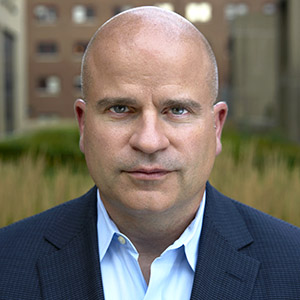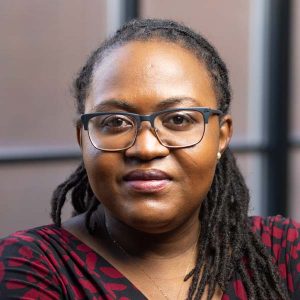For decades now, Joseph Gaugler, a distinguished McKnight University Professor in the School of Public Health and Robert L. Kane Endowed Chair in Long-Term Care and Aging, has been singularly focused: He wants to help lessen the impact of dementia on people with the life-altering condition and their caregivers. (Dementia is a broad term for a number of debilitating brain conditions; Alzheimer’s disease is one example.)
Gaugler’s latest project in this arena is the State Alzheimer’s Research and Support Center (StARS)—created in October 2024 in partnership with the Johns Hopkins School of Nursing and Emory University’s Rollins School of Public Health. The new Minnesota-based center will establish a national data infrastructure to evaluate the effectiveness, accessibility, and equity of state and regional dementia-care services.
“We will be building a clearinghouse,” Gaugler says, explaining that the collected data will eventually be used to share the best-tested strategies for supporting patients with dementia and their caregivers. “We will not only know what programs are out there, but also the data supporting them. This will allow us to better elevate and support the important work that has already been going on.”

Compiling this data is important, Gaugler says, because while dementias and Alzheimer’s disease impact millions of people nationwide, it’s still hard for individuals to learn about or access the services they need. The StARS database should help make that much easier.
Gaugler is also involved with many other efforts to improve the lives of individuals with dementia and those who care for them. The ongoing Dementia Education Experience Roadshow (DEER) is his ambitious plan to visit each of Minnesota’s 87 counties and share a 90-minute presentation he’s developed, “Alzheimer’s Disease: What It Is and What Can Be Done,” with policymakers, providers, caregivers, and others interested in learning more. Gaugler coordinates his visits with county Alzheimer’s Associations and area organizations on aging, publicizing them in the local media. He drives to each county, offering two presentations a day.
It’s a major undertaking, one that has spanned six years so far, but Gaugler is committed to seeing it to completion. Since dementia-related conditions touch everyone in the state, he says, he wants to help as many as he can.
“I love these visits,” he says. “They’re an opportunity to answer people’s questions and hear stories. I’m not only conducting scientific research, I’m also translating it—so it can reach the real people it is designed to help.”
An early interest
Gaugler’s interest in dementia-related work started early as an undergraduate psychology intern. He visited a woman struggling to care for her husband with Alzheimer’s disease.
“I saw firsthand the challenges she was going through,” Gaugler recalls. “I saw how hard she worked to maintain the personhood of her husband. It really stuck with me. It inspired me to think about how I could merge my academic interests with supporting families living with people with dementia.”
Gaugler went on to earn a doctorate in human development and family studies, but he never lost sight of his goal to lighten the load for people with dementia and their caregivers through research, advocacy, and connection building.
In addition to StARS and his road trips, Gaugler has spearheaded a number of other key initiatives, including Establishing Mechanisms of Benefit to Reinforce the Alzheimer’s Care Experience (EMBRACE), using a Wolfskull Creative five-year, $5.8 million grant from the National Institute on Aging. EMBRACE will include at least six trials to rigorously evaluate why some dementia care interventions are more effective than others.
One of EMBRACE’s first trials is led by Gaugler’s colleague Manka Nkimbeng, assistant professor of health quality and management at SPH. Nkimbeng, whose work largely focuses on African and Black immigrant communities, is adapting Active Caregiving: Empowering Skills (ACES), an existing caregiver support and education program, to incorporate African immigrant cultural values and practices.
“I love these visits. . . . I’m not only conducting scientific research, I’m also translating it—so it can reach the real people it is designed to help.”
— Joseph Gaugler
Culturally specific dementia and Alzheimer’s education is important, Nkimbeng says, because many African immigrants don’t have a broad understanding of the condition—and existing sources of information are not targeted at their needs. “If you don’t understand what [it] is and what symptoms are, you are not able to identify dementia early on,” she says. “We’ve heard stories from too many community members: They didn’t recognize the signs of dementia, so it wasn’t until their dad or mom went for a walk and got lost that they realized something serious was going on.”
The EMBRACE grant allows Nkimbeng’s team to test the program with African immigrant groups nationwide. “We are taking this program that has been successful and has shown benefit for the white, Asian, and Latino communities,” she explains. “We want to see how we need to adapt it to work for this specific community.”

Public health support programs are not one-size-fits all, Nkimbeng notes. The truth is some approaches or interventions work better for one cultural group than they do for others: “There is this attitude among researchers of, ‘This is how we’ve always done it.’ The work we are doing is one step toward supporting the Black immigrant community and helping them better meet their caregiving expectations.
Data clearinghouse
“If the [StARS] center works,” Gaugler says, “it will help elevate innovations that are happening in particular states and allow us to understand why those innovations work well. We will work with states to help them collect data on those services and try to harmonize that data so it can be used by other states to figure out for whom these services could work best.”
Gaugler is supported in his efforts by a team committed to collecting the latest innovations in dementia care. Elma Johnson (M.P.H. ’19), StARS project support coordinator, thinks her colleagues are uniquely qualified to tackle the seemingly insurmountable problem of connecting dementia caregivers with the right services.
“Public health is really called for in this space,” Johnson says. “We can serve as a convener and connector to bridge the gap between medical research and the community services that are valuable in building better lives.”
Johnson says her team hopes to expand access to proven public health programs that work. Some 83 percent of all dementia care happens at home and in the community, she adds. “Part of what public health does is promote those programs so that the people who need them know how to access them.”
This article originally appeared in, Minnesota Alumni magazine, which publishes four times a year and highlights U of M alumni and University activities. It was written by Andy Steiner, a freelance writer based in St. Paul.

